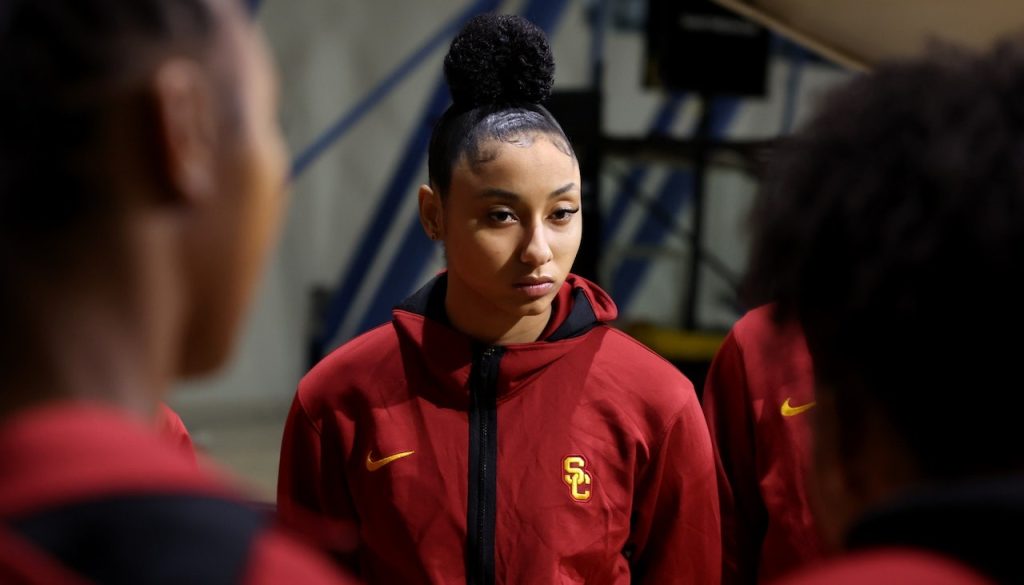JuJu Watkins, the rising star of USC women’s basketball, harbors a lofty ambition: to surpass Caitlin Clark’s NCAA all-time scoring record. After 50 college games, Watkins’s 1,318 points trail Clark’s 50-game mark by a mere 10 points, setting the stage for a potentially historic chase. Watkins acknowledges the record as a constant thought, driven by her desire to maintain her impressive scoring pace. While the expanded Big Ten conference and potential postseason runs offer Watkins more game opportunities compared to Clark’s college career, she remains grounded, even expressing admiration for Clark’s superior three-point shooting prowess, stating, “I wish I played like her.” Beyond individual accolades, Watkins has her sights set on a national championship, a feat Clark never achieved in college. With USC ranked among the top four teams nationally, Watkins’s first opportunity could arrive this March. However, their path to glory is challenged by their undefeated crosstown rival, UCLA, setting up a compelling late-season showdown.
Watkins’s journey to stardom has been marked by hard work and determination. She recalls a grueling workout with NBA star Draymond Green during the COVID-19 pandemic that pushed her to her physical limits, leaving her vomiting from exhaustion. Green, impressed by her resilience and return for subsequent workouts, recognized her immense potential. This experience, along with the challenges of adapting to the demanding college schedule, shaped Watkins’s perspective and fueled her growth. From winning the Sports Illustrated Kids’ SportsKid of the Year award in 2020 to becoming the top-rated college recruit in 2022, Watkins’s trajectory has been meteoric. Her decision to stay in Los Angeles and play for USC, despite offers from basketball powerhouses like South Carolina, further cemented her status as a local icon.
The spotlight on Watkins extends beyond the basketball court. Her burgeoning popularity, particularly after Clark’s transition to the WNBA, has elevated her to a subcultural icon, attracting a devoted following both locally and nationally. Watkins’s road trips, even those thousands of miles from home, draw large crowds eager to witness her electrifying performances. She recognizes and appreciates the increased attention on women’s basketball, crediting Clark for igniting this surge in interest. Watkins, however, remains mindful of the hardships that paved her way to success, acknowledging the transformative experience of adapting to the rigors of college life.
Watkins carries a unique legacy. Her great-grandfather, Ted Watkins, played a pivotal role in the Watts community of Los Angeles, founding the Watts Labor Community Action Committee (WLCAC) in 1965. This organization became instrumental in community development, providing essential services and opportunities for residents, particularly in the aftermath of the Watts riots. Ted Watkins’s work fostered community empowerment and self-reliance, a legacy that resonates deeply with JuJu. His commitment to social justice and community upliftment has undoubtedly influenced Watkins’s own advocacy for players’ rights and a more equitable future for women’s basketball.
As women’s basketball enjoys its newfound prominence, Watkins remains acutely aware of the ongoing fight for players’ rights and fair compensation. She emphasizes the significance of players advocating for their due, recognizing that true change arises from voicing concerns and challenging inequities. The recent WNBA players’ union vote to opt out of the current collective bargaining agreement highlights the ongoing struggle for improved conditions. Watkins strongly supports the players’ pursuit of better benefits, particularly in light of the long-overdue introduction of charter flights, stating, “Charter flights, that was long overdue. It’s what these women deserve.”
Watkins eagerly anticipates her own entry into the WNBA, likely in 2027 or later, recognizing the importance of the upcoming CBA negotiations for her future and that of her fellow players. She hopes that the momentum generated by Caitlin Clark’s arrival and the heightened attention on the league will translate into a more sustainable and profitable future for the WNBA. While acknowledging the controversies and criticisms surrounding Clark’s impact, Watkins views her influence as overwhelmingly positive. She admires Clark’s transformative effect on the sport’s trajectory, recognizing that even negative attention contributes to the overall growth and visibility of women’s basketball. Embracing both supporters and detractors, Watkins remains focused on her goals, both on and off the court, driven by a desire to excel and contribute to a more equitable future for the sport she loves.

